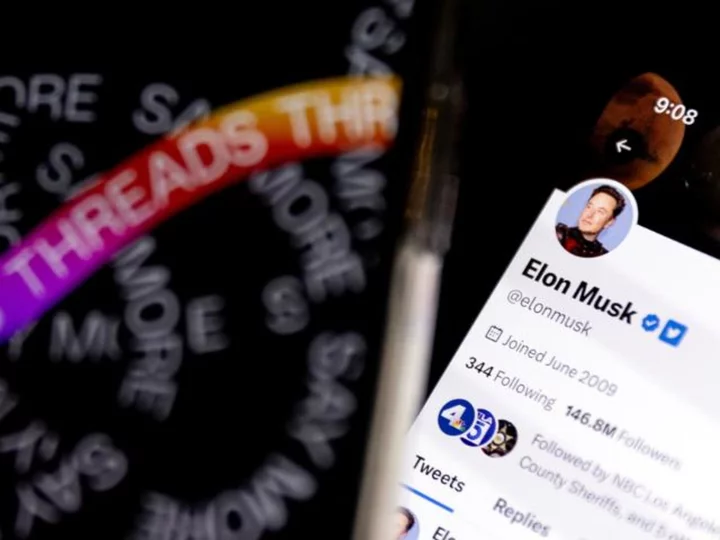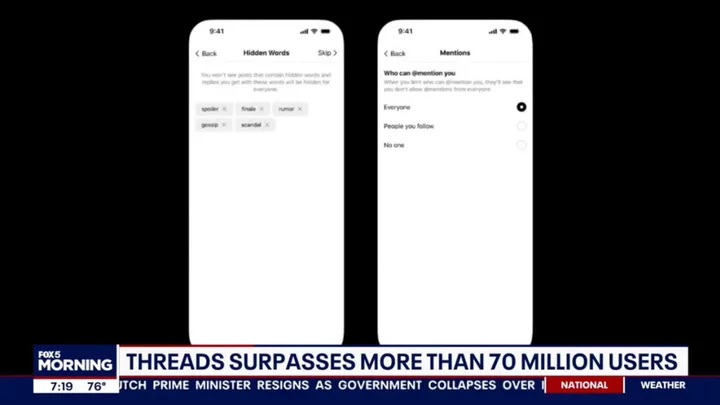
EU blesses transatlantic data sharing deal
The European Union on Monday gave final approval to an agreement with the US government that restores the ability for thousands of businesses to easily transfer the personal information of European citizens to servers located in the United States, and vice versa, in the face of surveillance concerns by privacy advocates.
2023-07-11 02:26

Sarah Silverman sues OpenAI and Meta alleging copyright infringement
Comedian Sarah Silverman and two authors are suing Meta and ChatGPT-maker OpenAI, alleging the companies' AI language models were trained on copyrighted materials from their books without their knowledge or consent.
2023-07-11 01:54

Sarah Silverman and other authors sue ChatGPT creator over claims it stole their texts
Two of the world’s biggest artificial intelligence firms are being sued by celebrities including Sarah Silverman. The writers claim that ChatGPT creator OpenAI and Facebook parent company Meta used their text to train their artificial intelligence systems, without permission. “Since the release of OpenAI’s ChatGPT system in March 2023, we’ve been hearing from writers, authors, and publishers who are concerned about its uncanny ability to generate text similar to that found in copyrighted textual materials, including thousands of books,” wrote Joseph Saveri and Matthew Butterick, the lawyers behind the class-action complaint. Mr Saveri and Mr Butterick have already launched legal proceedings against GitHub Copilot, an AI coding assistant, as well as Stable Diffusion, the popular AI image generator. They call the systems “industrial-strength plagiarists” on a website built to track and promote that work that also includes the complaints that have been filed in California. Last week, the two lawyers launched class-action lawsuits against OpenAI, arguing that it was remixing the “copyrighted works of thousands of book authors—and many others—without consent, compensation, or credit”. That complaint was initially launched on behalf of two authors, Paul Tremblay and Mona Awad, who have since been joined by Sarah Silverman, Chris Golden and Richard Kadrey. The lawsuit alleges that their work had been downloaded from “shadow library” websites that make it possible to download large amounts of text in bulk. They were then used to train the ChatGPT and LLaMa systems made by Meta and OpenAI, it claims. The suit shows that ChatGPT will summarise those authors’ books when prompted, infringing copyright and not giving any of the copyright information about the books, the lawyers claim. The authors “did not consent to the use of their copyrighted books as training material”, the lawsuit says. OpenAI did not respond to a request for comment from The Independent. Meta declined to comment. Read More Will.i.am hails AI technology as ‘new renaissance’ in music Instagram Threads hits 100 million users SpaceX smashes reusable rocket record as Elon Musk makes bold Starship claim
2023-07-11 01:28

Elon Musk jet-tracking account moves to Twitter rival Threads
One of Elon Musk's least-favorite Twitter users is moving to Meta's competing platform Threads.
2023-07-11 00:46

Twitter's future is in doubt as Threads tops 100 million users
Twitter has weathered months, if not years, of mismanagement as well as mass layoffs, frequent service disruptions and an exodus of top advertisers, but the launch of a rival app from Meta could prove to be the final straw.
2023-07-11 00:16

Scientists make surprising discovery that could help boost the global population
Infertility is a problem that afflicts more than a billion people across the world, which is why treatments such as IVF are so important. The procedure (in vitro fertilisation, to use it’s full name) involves the extraction of an egg from the woman's ovaries to be fertilised with sperm in a laboratory and returned to the woman’s womb. The goal is that the resulting embryo will then grow and develop into a foetus, blessing the parent or parents with a baby. However, success rates for IVF – as in, the percentage of treatments that result in a live birth – remain somewhat unencouraging: 32 per cent for women aged under 35; 25 per cent for women aged 35 to 37, with the numbers continuing to drop the older you get, according to the NHS. Nevertheless, a major new study has revealed a striking new finding which could help boost the hopes of countless aspiring mums and dads across the world. Sign up for our free Indy100 weekly newsletter After analysing 3,657 frozen embryos over a period of eight years, researchers in Western Australia found that IVF was much more likely to work when eggs had been harvested in the summer. The team clarified that it didn’t seem to matter when the embryos were transferred to the mother’s womb, just when the eggs were collected. Indeed, the likelihood of babies being born when the eggs had been retrieved in the summer was 30 per cent higher than when they had been retrieved in the autumn, according to the scientists. The team also found that the temperature on the day of egg collection didn’t seem to have an impact on success rates, but the number of sunny hours did. Of the embryos they tested, those harvested on days that had the most sunshine were 28 per cent more likely to result in a live birth compared to the darkest and most overcast days. “Our study suggests that the best conditions for live births appear to be associated with summer and increased sunshine hours on the day of egg retrieval,” the study’s lead, Dr Sebastian Leathersich, of Perth’s King Edward Memorial Hospital, said about the paper, which was published in the journal Human Reproduction. Still, he noted: “There are many factors that influence fertility treatment success, age being among the most important. “However, this study adds further weight to the importance of environmental factors and their influence on egg quality and embryonic development." He further explained: “We effectively separated the conditions at the time of egg collection from the conditions at the time of transfer, demonstrating that environmental factors when the eggs are developing are as, if not more, important than environmental factors during implantation and early pregnancy.” The expert obstetrician and gynaecologist added: “Optimising factors such as avoiding smoking, alcohol and other toxins and maintaining healthy activity levels and weight should be paramount. However, clinicians and patients could also consider external factors such as environmental conditions.” Despite Dr Leathersich and his colleagues concluding that the temperature on the day of egg collection had little bearing on the success of the process, they also found that the temperature on the day of embryo implantation did make a difference. The chances of a live birth rate decreased by 18 per cent when the embryos were transferred on the hottest days (when average temperatures measured between 14.5C and 27.8C) compared to the coolest days (0.1C to 9.8C), and there was a small increase in miscarriage rates, from 5.5 per cent to 7.6. The finding that miscarriage rates were highest when embryo transfer took place on the hottest days is consistent with other studies showing higher rates of miscarriage in the summer months. “This suggests that the negative effects of high temperature are more likely related to early pregnancy rather than egg development,” Dr Leathersich concluded. When it comes to the disparity in success rates between eggs retrieved in summer and autumn, he and his team pointed out that melatonin levels could be at play. Differences in lifestyles between the winter and summer months may also play a role, he and his colleagues acknowledged. "It is possible that there are differences in activity, diet, and lifestyle in different seasons which could underlie the observed differences in live birth rates, though such data were not collected in this study," they wrote. "It is also possible that other environmental factors, including pollutants, may impact clinical outcomes." Whilst the study’s findings are compelling, Dr Leathersich and his team admitted that it did have its limitations. The research was done in hindsight, using eggs that had been frozen, then thawed, so it could not draw watertight conclusions. “Ideally, these findings should be replicated in other sites with different conditions and different treatment protocols to confirm the findings,” Dr Leathersich said. “It would also be interesting to look at the impact of season and environmental factors on sperm parameters, as this could have contributed to our observations.” He added: “We are now planning to analyse this same group of patients using air quality data, as there may be seasonal changes in exposure to harmful pollutants which could negatively affect reproductive outcomes. “Finally, given the huge increase in so-called 'social egg freezing' for fertility preservation and the fact that this group generally have flexibility about when they choose to undergo treatment, it would be very interesting to see if these observations hold true with frozen eggs that are thawed and fertilised years later. “Any improved outcomes in this group could have big impacts for women making decisions about their future fertility, but the long-term follow-up required means it is likely to be some time before we can draw any conclusions for this population.” Have your say in our news democracy. Click the upvote icon at the top of the page to help raise this article through the indy100 rankings.
2023-07-10 23:20

India Billionaire’s Chip Foray Faces Setback as Foxconn Exits
Anil Agarwal’s $19 billion semiconductor-making ambitions in India were dealt another setback after his Taiwanese partner decided to
2023-07-10 22:20

Threads Hits 100 Million Users Days After Launch
Meta Platforms Inc.’s answer to Twitter has rocketed to 100 million users in less than a week, Chief
2023-07-10 22:16

Threads ‘666’ logo conspiracy theory can be undermined by one simple historical fact
Since Instagram’s text-based alternative to Twitter, Threads, rolled out last week, a handful of memes and conspiracy theories have surfaced around the app’s unusual ‘at symbol’-like logo – from the inaccurate suggestion it was predicted by The Simpsons (it wasn’t), and now, to claims it’s actually linked to the devil (it isn’t). The baseless theory - seemingly backed by Twitter owner Elon Musk himself, if his public tweet likes are anything to go by – suggests the swirly icon secretly contains the number ‘666’, often referred to as “the number of the beast” and considered a link to the Antichrist. Sign up to our free Indy100 weekly newsletter Claiming they “can’t stop seeing it”, one Twitter user asked: “Does anyone else think the Threads logo just looks like 666? The first 6 is forward and white, then the second one is smaller and backwards, and the third one is the black space inside.” “How to put 666 ‘the number of the beast’ into a logo,” wrote another, in a tweet liked by Musk. Several other accounts have branded Threads “satanic” over the supposed link. In fact, the baseless claim became so popular that Instagram boss Adam Mosseri shared a thread on Friday explaining the real meaning behind the logo. “The Threads logo, in Instagram Sans, is inspired by the @ sign, which stands for someone’s username, the individual, and voice. “It’s a single unbroken line, inspired by the loop seen in the app when a thread is started,” he wrote. When one user commented that it “would have been entertaining” if Mosseri jokingly confirmed the conspiracy to be true, the exec replied: “It was tempting, but I feel like that kind of sass would just blow up in my face.” Sensible. Of course, this is just one fact which dispels this conspiracy theory as nonsense and baseless, but one lesser-known bit of historical trivia also exposes just how outlandish the claim is. All the way back in 2005, it was reported that a newly discovered fragment of the oldest version of the New Testament – the second part of the Bible – from the third century gave a different number entirely for the number of the beast. Found in historic dumps near Oxyrhynchus in Egypt, the text from the Book of Revelation indicates it’s not 666 which is the fiendish number we should all be fearing, but the far less aesthetically pleasing 616. Professor David Parker, Professor of New Testament Textual Criticism and Paleography at the University of Birmingham, said: “This is an example of gematria, where numbers are based on the numerical values of letters in people’s names. “Early Christians would use numbers to hide the identity of people who they were attacking: 616 refers to the Emperor Caligula.” This is in contrast to the far more popular 666, which is understood to have referred to Emperor Nero. Have your say in our news democracy. Click the upvote icon at the top of the page to help raise this article through the indy100 rankings.
2023-07-10 17:59

Alibaba, Tencent shares rise as investors bet China's tech crackdown is over
By Scott Murdoch and Donny Kwok HONG KONG (Reuters) -Alibaba Group and Tencent shares rose in Hong Kong on Monday
2023-07-10 16:27

Ocado launches first robotic warehouse in Asia with Aeon
LONDON British online supermarket and technology group Ocado said on Monday its first robotic warehouse in Asia, built
2023-07-10 15:52

Instagram Threads hits 100 million users, becoming easily the fastest growing app ever
Instagram’s Threads app has reached 100 million users, making it easily the fastest growing app ever. The site reached the number early on Monday morning, according to a tracker that looks at the numbers that are made public on each Threads account.
2023-07-10 15:51
